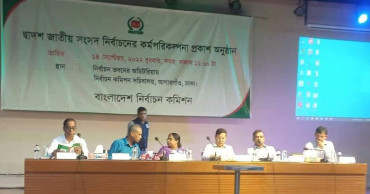Bangladesh Election Commission
Know before you vote: Bangladesh launches 333 Helpline
The government has launched a special information service through national helpline 333 in collaboration with the Bangladesh Election Commission.
The initiative aims to make the election process more transparent, participatory, and citizen-friendly.
Citizens can call the toll-free number 333 from any mobile operator and press 9 to receive necessary information and assistance related to the election, according to a press release issued by the Post, Telecommunication and Information Technology Ministry.
Services under this initiative include guidance on voting procedures, polling station locations, national ID card details, election-time conduct, voting rules for expatriates, special facilities for differently-abled, elderly, and female voters as well as emergency instructions and essential contact numbers.
The helpline also provides detailed guidance on using the Election Commission’s designated apps, Smart Election Management BD and Postal Vote BD.
Since its pilot launch on January 16, the service has already assisted 1,643 citizens with election-related information.
Besides, the authorities are exploring the use of option 9 on 333 as a tool to collect information on law-and-order situation, detect potential unrest early, and quickly alert the relevant authorities.
However, the helpline will not function as a direct police control room and it will operate as an “Information Intake, Early Warning & Forwarding System,” forwarding necessary information to 999 or the concerned authorities as required.
27 days ago
Polls Observers: IRI, NDI joint technical assessment team to stay 6-8 weeks in Bangladesh
The National Democratic Institute (NDI) and International Republican Institute (IRI) joint team, now in Bangladesh, will conduct a "limited technical assessment" focused on potential electoral violence conditions before, during, and after the country’s January 7 parliamentary elections.
The team comprises five long-term analysts, who have received accreditation from the Bangladesh Election Commission and will stay in Bangladesh for six to eight weeks, according to an announcement made on December23.
Quality education important to have well-educated generation: Saudi Envoy
The technical assessment includes a thematic analysis of different types of election violence, including inter and intra-party violence, violence targeting women and other marginalized groups, and online harassment and threats, as well as the role of state institutions in addressing these types of violence, in order to evaluate the drivers and implications of election violence during the election cycle.
Following the conclusion of the electoral process, IRI and NDI will present a technical assessment report on electoral violence along with constructive recommendations to reduce violence in future elections.
This deployment follows a joint pre-election assessment mission (PEAM) that NDI and IRI conducted from October 8 to 11, 2023.
Those who are boycotting polls not realistic, lack leadership quality: FM
The observations from the PEAM informed the structure and scope of the technical assessment, which is being conducted in accordance with the laws of Bangladesh and consistent with the Declaration of Principles for International Election Observation, which was endorsed in 2005 at the United Nations.
IRI and NDI are nonpartisan, nongovernmental organizations that support and strengthen democratic institutions and practices worldwide.
The Institutes have collectively observed more than 200 elections in more than 50 countries over the last 30 years.
Meanwhile, MoFA Spokesperson Seheli Sabrin in a weekly briefing on Thursday said nine countries have confirmed to observe the 12th national election scheduled for January 7.
Boosting Dhaka’s connectivity: Japan funding for Hazrat Shahjalal Airport’s major upgrade
India, Sri Lanka, China, Russia, Japan, Uzbekistan, Mauritius, Georgia and Palestine are sending observers, she said.
On the other hand, the OIC, Commonwealth and the Arab Parliament will also observe the elections, she mentioned.
A four-member EU expert panel is already in Dhaka to observe the election.
2 years ago
Next national election by Jan 29, 2024; EVMs to be used in 150 constituencies
The next general election in Bangladesh will be held by January 29, 2024 with the use of electronic voting machines (EVMs) in 150 constituencies out of 300, according to a roadmap published by the Election Commission.
“Seventeen out of 29 parties who participated in the recent dialogue gave positive opinion on the use of EVMs while 12 rejected use of EVM. The Election Commission thinks that it will not be rational to use EVMs as most of the political parties want. Use of EVMs in 150 constituencies will be rational for balancing the opinions of all parties,” Election Commissioner Md Ahsan Habib, gave the keynote speech as chief guest in the absence of the CEC.
Read:AL hails EC decision to use EVMs in 150 JS seats in next polls
EC also said the election has to be held by January 24, 2024 as per the constitution.
Chief Election Commissioner (CEC) Kazi Habibul Awal could not attend the event due to illness, but four other Election Commissioners along with senior EC officials were present.
The Election Commission (EC) published the roadmap for the upcoming 12th National Assembly elections.
Read: EVMs to be used in maximum 150 constituencies in next national polls: EC
This was revealed at a function held at the auditorium of the Election Commission building on Wednesday.
The action plan mentions the challenges to holding fair elections, what the EC should do to deal with them, review the activities of the parties, increasing the use of election technology etc.
The EC said that no one has been able to provide proof of EVM rigging in all the elections that have taken place so far.
Read BNP turns down EC’s move to use EVMs up to 150 seats
Setting parliamentary constituency boundaries
The roadmap says that a new policy will be made in January 2023 to redefine the boundaries of the parliamentary seats. On the basis of which the Geographical Information System will be discussed with the relevant institutions and experts, and the draft of the constituencies will be published in March 2023. The revised delimitation of 300 constituencies will be gazetted in June after objections to the draft were settled in May.
Voter list
The action plan informs that updates are currently in progress. The updated list will be released on March 2, 2023. With the announcement of the parliamentary election schedule, the voter list of 300 constituencies will be published.
Read Election to 61 district councils (Zila Parishads) on October 17
Polling stations
EC plans to set up 42,000 polling stations. In this case, the work will be undertaken in June 2023. The draft will be published in July, and the objections will be settled on the draft in August. After that, Election Commission will publish the gazette of the polling station 25 days before the polling.
Inspection of parties
The process of reviewing the activities of the registered parties will begin this September. In this case, after reviewing all the information, the Election Commission will decide which party's registration will be maintained in May 2023. The final list of registered parties will be published in June of the same year. Before this, registration of new parties will be announced in May.
Read EVMs to be used in maximum 150 constituencies in next national polls: EC
3 years ago





